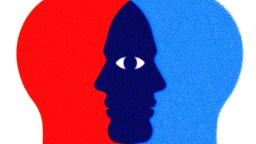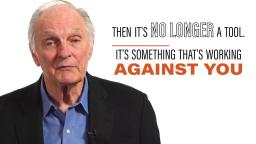In this compilation video, our biggest thinkers share their insights on debating, including how to get your points across effectively, hold your own in an argument, and disagree better.
BO SEO: One of the reasons why our arguments are so divisive, and painful at present is that we've allowed the skills of disagreeing well to atrophy. We no longer view argument as a skill, and as something to be worked at. Rather, we see it as something we jump into, out of instinct or defensiveness.
DAN SHAPIRO: Why is our world so divided right now? It's like we're in this vast sea of identity, a singular identity, and it's really hard to locate who we are. The moment we feel threatened we tend to move back, to this fundamental, primal sense of belonging, that I call tribes. I believe that our world is becoming more and more, a tribal world.
ESTHER PEREL: When people disagree, they literally have the capacity to listen to 10 seconds of what the other side has to say. 10 seconds-that's three sentences. And by then, they already are busy creating their rebuttal. You are saying the same thing over and over again, and I'm saying the same thing over and over again, and those two never meet. And the more I say "X," the more I make you say "Y." It's me who is reinforcing you saying the fundamental thing with which you disagree with.
SEO: Thomas Hobbes took a pretty pessimistic view, not only of disagreements, but the kinds of people we become, when we engage in disagreements. He believed that these petty disputes can grow into a conflagration that brings down, not only relationships, but also nations. And this was a man who lived through periods of war, and so he saw the destructive force that arguments can be. And looking at all that damage, he concluded that the appropriate response was to take on a posture of civil silence towards one another. That we wouldn't engage in these disagreements, that we would grin and bear to tolerate one another's differences. The problem with that is our commonalities are only one part of the fullness of our relationship with one another. A life built just around agreement is an impoverished life, because it requires taking away, and ignoring that variety is a source of challenge. It's the way in which we piece together truth from different perspectives. It's the way in which we go beyond ourselves. Arguments are easy to start and hard to end, because difference is the natural state of things. How do we disagree better? Every disagreement should start with a little bit of agreement. There are any number of differences between two people, and when one of those issues comes to the fore, you can have a disagreement. But unless you are selective about the kinds of arguments that you pick, and unless you are careful to say, "We're having this disagreement at this moment, and not all the other disagreements we could be having," all of the differences between two people can start flooding in and the argument becomes this unruly mass, and you're not making progress on any given one.
PEREL: All relationships are colored with expectations about myself and about the other. My expectations influence that which I then see or hear. It is a filter, as well as my mood is a filter. We in communication have the ability to set the other people up, because we will draw from them the very things which we expect from them, even when it's the opposite of what we really want. We create the others in relationships and in communication. It isn't just that's who they are and that's who we are, it's how people actually co-create each other in the context of a relationship, and why we are not the same person with different people, because those people make part of who we are. When we are in conflictual relationships, we will often be prone to negative attributions, which is that when you speak to me a certain way, it's because you have a bad temper, or you have a nasty personality. When I speak to you in a certain way, it's because I had a lot of traffic getting here this morning and because I'm having a bad day. You are a bad person. I have just bad circumstances. I essentialize you, and I contextualize me.
SHAPIRO: When it comes to emotionally charged conflict, why is it so hard to listen? Because my identity is feeling threatened. You're not just attacking some cerebral ideas I have. You are attacking my values system. The moment our identity feels threatened, all of a sudden we fall prey to a mindset, a dangerous mindset that I call the 'tribes effect.' Once you attach to a tribe, something strange happens. No longer is content as important, the substance of the argument- this is an us versus them way of thinking. Now I wanna move toward being with a group of people like myself who are going to protect me, and my interests from becoming trampled. So I will argue and defend my perspective to no ends, but I'm going to close my ears to your perspective.
SEO: So much of debate is an exercise in certainty. It's about spending sometimes weeks, researching your side of the case, coming up with the best possible arguments that you can, coming up with the best lines that you can to sell the truth of your side to the listener. But in the last moments before a debater goes on stage, they know to take a breath, to take out a new sheet of paper, and to put themselves in their opponent's shoes, and write the four best arguments for the opposing side. They know also to look over their case again this time through the eyes of someone who fervently disagrees with them, and to identify all of the flaws and the mistakes and the criticisms that could be leveled against them. Debaters also know to imagine a world in which they lost the debate, and to come up with the reasons why they did. Those exercises, which are called the side-switch exercises, puts a pause on that feeling of certainty. It makes us feel for a moment the subjective reasonableness of other people's beliefs. It gives us that moment where we get back on our toes and think maybe we missed something. It makes us imagine a world in which we're wrong, or at least we're judged to be wrong. And all of that isn't humility, isn't empathy in and of itself, but it creates a wriggle room through which something, like humility or empathy might arise.
PEREL: What is lacking is the ability to see that speaking is entirely dictated by the quality of the listening that is reflected back on us. Maybe you can acknowledge the validity of my point of view. That doesn't mean you agree with my point of view, but my point of view makes sense. And potentially you may even empathize with my point of view. You can understand why I would think, or feel or experience things the way I do. That reflecting back, acknowledging, validating, empathizing, that sequence is where the depth of communication takes place.
SHAPIRO: Shift that dynamic so it's no longer me versus you. Instead it's the two of us sitting side by side together, facing the same shared problem.
PEREL: It's my ability to take in what you say, to mull it over, to include it in my response, so that I make you feel that you matter, that what you say makes a difference, that you're not just talking to the wind. Because ultimately, if I speak to you, and in the end I leave feeling even more alone, I am literally in an existential crisis. There is nothing worse, than to be alone in the presence of another.
SEO: Where the conflict-diverse person, and the highly-combative person meet, is in their shared desire for a connection, and it's a connection that they don't get just by persisting in their most natural modes. You can't connect if the only grounds on which you connect with another person, or you reach out to another person is similarity, rather than difference. And similarly, you can't connect, if your whole desire is to dominate, or to show yourself to be superior than the other ones. Every human contains both of these instincts within them. The middle ground where good arguments stem from, is from a recognition that it's through connection with others. It's through an encounter with others, that we get more than we would be able to on our own.
NARRATOR: Want to dive deeper? Become a Big Think member and join our members-only community, watch videos early, and unlock full interviews.









